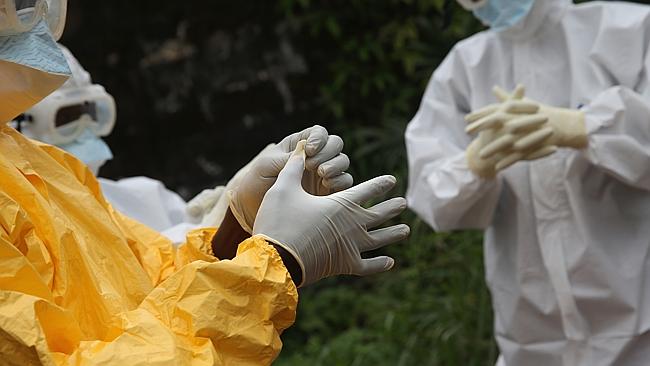
Deadly virus … the world is in the grip of an Ebola outbreak, which has killed thousands. Picture: John Moore/Getty Images) Source: Getty Images
THE current Ebola outbreak is just the beginning of a pattern of deadly emerging diseases that will wreak havoc in coming years, a leading science writer has warned.
David Quammen has spent years researching emerging viruses officially known as zoonotic — they live in an animal host and occasionally jump to, or “spill over”, into human beings.
With the US in the grips of an Ebola panic after Texan nurse Nina Pham was diagnosed with the deadly virus, Quammen has issued an ominous warning: “This is not a one-time deal”.
The author, whose 2012 book on the subject Spillover won an award from the National Association of Science Writers, told mashable.com even if the current Ebola epidemic was brought under control, it’s “not going to be the end of the story”.

Infected … Texan nurse Nina Pham is the first person to be diagnosed with Ebola in the US. Source: Supplied
“That’s not going to be any final solution because next year, or the year after, there’ll be another viral outbreak that either turns into an epidemic or threatens to. So that’s the first thing, but of course nobody wants to hear that right now, because everyone is so concerned about and obsessed with Ebola — and I understand that, it’s a horrible situation.”
Worryingly, Quammen believes Ebola is not the virus that the world should be concerned about.
He believes the real threat is a new zoonotic virus that will come out of an animal host and will most likely be respiratory — passed on by a sneeze or cough.

Protective measures … an environmental worker moves disposal barrels to a staging area outside Nina Pham’s apartment. Picture: AP Source: AP
“It will be probably a single-stranded RNA virus,” he said.
“And that means one of a certain limited number of families of viruses that, because they have their genomes on single stranded RNA, they have higher mutation rates, and therefore have higher rates of adaptation. Therefore, they have the potential to adapt better and quickly to human hosts and to transmission from one human host to another.”
He said only a small number of groups or families of viruses fit those characteristics — the families that encompass the SARS and MERS viruses.
The biggest risk, he says, is influenza, which experts still believe is more likely to kill millions more people than any other virus.

Fears … a “no trespassing” notice is posted on the door of Nina Pham’s apartment. Source: AP
US health officials have urged the nation’s hospitals to be prepared for Ebola and launched a review of procedures for treating infected patients, while the World Health Organisation called the outbreak “the most severe, acute health emergency seen in modern times.”
Public-health authorities also intensified their monitoring of workers at the Dallas hospital where Ms Pham worked.
The 26-year-old nurse was caring for Liberian man Thomas Eric Duncan, who died of Ebola. She was wearing protective gear, but became the first person to contract the disease within the United States.

Tragic … Ebola survivor Abrahim Quota, 5, is handed a letter confirming his recovery from the virus in Monrovia, Liberia. Both of his parents died while at the treatment centre, according to fellow survivors. Picture: Getty Source: Getty Images
Pham, a graduate of Texas Christian University’s nursing school, was monitoring her own temperature and went to the hospital Friday night as soon as she found out she was running a low fever. She is in isolation and in stable condition, health officials said.
Quammen told mashable.com he believed the Dallas case had been badly handled and had fuelled fears even more.
“Now people are saying, well I want to protect my children, we should close the borders, whatever they’re saying. They’re confused and scared,” he said
“The facts are, still, that Ebola doesn’t transmit from human to human very readily. But, the people who made mistakes in Dallas certainly aided the possibility of it affecting more people in Dallas, and there may be more cases and that will scare people even more.”

Fear factor … people gather outside the Island Clinic Ebola treatment centre in Monrovia. A planned strike was averted as most nurses and health care workers reported for work. Picture: Getty Source: Getty Images
The science writer said his biggest concern was the “social breakdown” that comes due to unfounded fears.
“That kind of suspicion and that kind of sudden urge for isolating oneself from the problem is not a solution to the problem. Isolation is very important on the case level, but you can’t effectively isolate neighbourhoods and you can’t isolate countries in the world we live in — we’re just so interconnected.”
Originally published as Ebola virus is just the beginning
